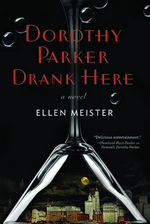 Dorothy Parker Drank Here
Dorothy Parker Drank Here
Hardcover, 336 pg.
G.P. Putnam’s Sons, 2015
Read: March 9 – 10, 2015
 Meister’s previous novel, Farewell, Dorothy Parker, was an enjoyable though fairly predictable but well-executed tale with characters I appreciated. While I intended to track down more by Meister, I hadn’t yet. One thing I didn’t expect was to see a sequel — there was really nothing in the it to make me think one was forthcoming — or necessary. So I didn’t read this with any great sense of anticipation, mostly just hoping that it wouldn’t be worse than Farewell.
Meister’s previous novel, Farewell, Dorothy Parker, was an enjoyable though fairly predictable but well-executed tale with characters I appreciated. While I intended to track down more by Meister, I hadn’t yet. One thing I didn’t expect was to see a sequel — there was really nothing in the it to make me think one was forthcoming — or necessary. So I didn’t read this with any great sense of anticipation, mostly just hoping that it wouldn’t be worse than Farewell.
Well, it wasn’t worse — it was actually better.
Ted Shriver is a — was a — literary star. A novelist of a stature and fame that every MFA student dreams of — until plagiarism scandal a few decades ago ruined that career and turned him into a recluse. He’s currently residing in the Algonquin Hotel, which is where the same hotel that the ghost of Dorothy Parker is spending as much of eternity as she can. Enter Norah Wolfe, a young producer about to be out of a job when the talk show she works for is going to be canceled. She’s got this crazy idea, though — if she can get her hero, Shriver, to come on the show and be interviewed for the first time since the scandal, she just might be able to keep the show on the air. And a certain ghost decides to join the cause, as soon as she convinces Norah that she’s really there.
I know, outlandish, right? An appearance by a novelist is going to save a TV show —puh-leez. (the ghost tied to a guest book is completely believable by comparison).
I do think (but haven’t compared the two in order to examine), that this time, Dorothy Parker isn’t as much fun — either in antics or dialogue. But she’s more flawed, more regretful over the past, more self-reliant, lonelier. — basically, she’s a more well-rounded character reflecting a lot of the less snarky, less quotable Parker. Shriver was believable (and a self-pitying jerk), I think the story could’ve used more time with him as an active character, not just the person everyone is reacting to (even when he’s nowhere to be seen). Norah is our Point of View character — she’s likable, driven, damaged (in a pretty obvious way), and it’s not long before you’re wanting things to work out for her. There are a few other notable characters — and a few that are little more than one dimension, but on the whole you are left with the impression that they could easily be more than that.
I did wonder at the lack of any mention of the events of the previous novel or its protagonist, even in passing. Which means you can read these independently of each other, or in whatever order you wish.
This wasn’t a perfect novel — there was one subplot that was largely unnecessary and a little annoying (but in the end, Meister used it effectively, but she could’ve found another way to achieve the same ends). Other than that, compared to its predecessor, I thought the characters were more complex, the emotional stakes were richer, and the book was about more than just the pretty straight-forward plot. A pleasant read, give it a shot.
—–


